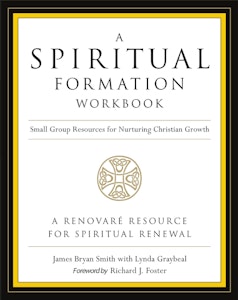Introductory Note:
What better way to “acknowledge the Lord in all our ways” than to open up space for the Holy Spirit to dwell within us—directing us, correcting us, strengthening us, showing us how to love?
The Incarnational Tradition has the aspect of cooperating with God so as to “let the power and life of God flow through us, [and] we become the person he created us to be and God becomes known to the world through us.” An infusion of the Holy Spirit will unite what was divided and bring harmony to discord.
Renovaré Team
 Excerpt from A Spiritual Formation Workbook
Excerpt from A Spiritual Formation Workbook
[The] Holy Spirit dwells in the children of God, and his presence is necessary for us to practice the Traditions. This is particularly true of the Incarnational Tradition.
As physical beings we find it easy to focus on the material — the things we can see and touch. We need food to live and we enjoy eating. Our bodies get cold so we buy clothes. When we hit our thumb with a hammer, it hurts until we take a painkiller. Because we are sentient beings, everything we know about ourselves, other people, and our world comes through our senses. We are matter ourselves, so we perceive matter easily.
This presents a huge problem when we start exploring the world of the spirit. We cannot smell, taste, touch, see, or hear the spiritual, so we hesitate to believe it is real. We relegate it to a special category, a “pigeonhole,” allowing it out only on special “holy” days or when we have a specific need (such as a need for physical healing).
The Holy Spirit helps us overcome this disunity by promoting the harmony of the physical and the spiritual. At their creation, Adam and Eve’s bodies and spirits were in perfect harmony. But at the fall, their bodies took charge and started warring with their spirits. The apostle Paul clearly describes this problem when he exclaims, “For I do not do what I want, but I do the very thing I hate” (Rom. 7:15b). In his book Miracles, C. S. Lewis describes this condition as “estrangement” and envisions a day “when nature and Spirit are fully harmonised — when Spirit rides nature so perfectly that the two together make rather a Centaur than a mounted knight” (p. 161).
The primary means that the Holy Spirit uses to heal this estrangement is our practice of the spiritual disciplines. When we fast, we are telling our body that matters of the spirit are important. Serving another person puts his or her needs ahead of ours. In simplicity we are freed from the tyranny of always getting our own way. Worship reminds us that we are “dust.” The spiritual disciplines put our bodies in a place where God can work his goodness into us and bring harmony into our lives.
And when our bodies and our spirits start to come back into harmony, we do away with categories. We easily move between religious and everyday activities, treating them as of equal value because God is present in both. And all that we say, all that we do, all that we are becomes a means to make God’s presence real to those around us.
When our life is a “seamless garment,” we are free to reveal God to the world. Wholly available to God, we become his representative, his emissary, and he does his work through us. Our mind becomes the mind of God helping his children understand his love. Our hands become the hands of Jesus nursing the sick. Our voice becomes the voice of Christ proclaiming the good news of the kingdom of God. Our arms become the arms of the Holy Spirit loving the sinner unconditionally. As we let the power and life of God flow through us, we become the person he created us to be and God becomes known to the world through us.


